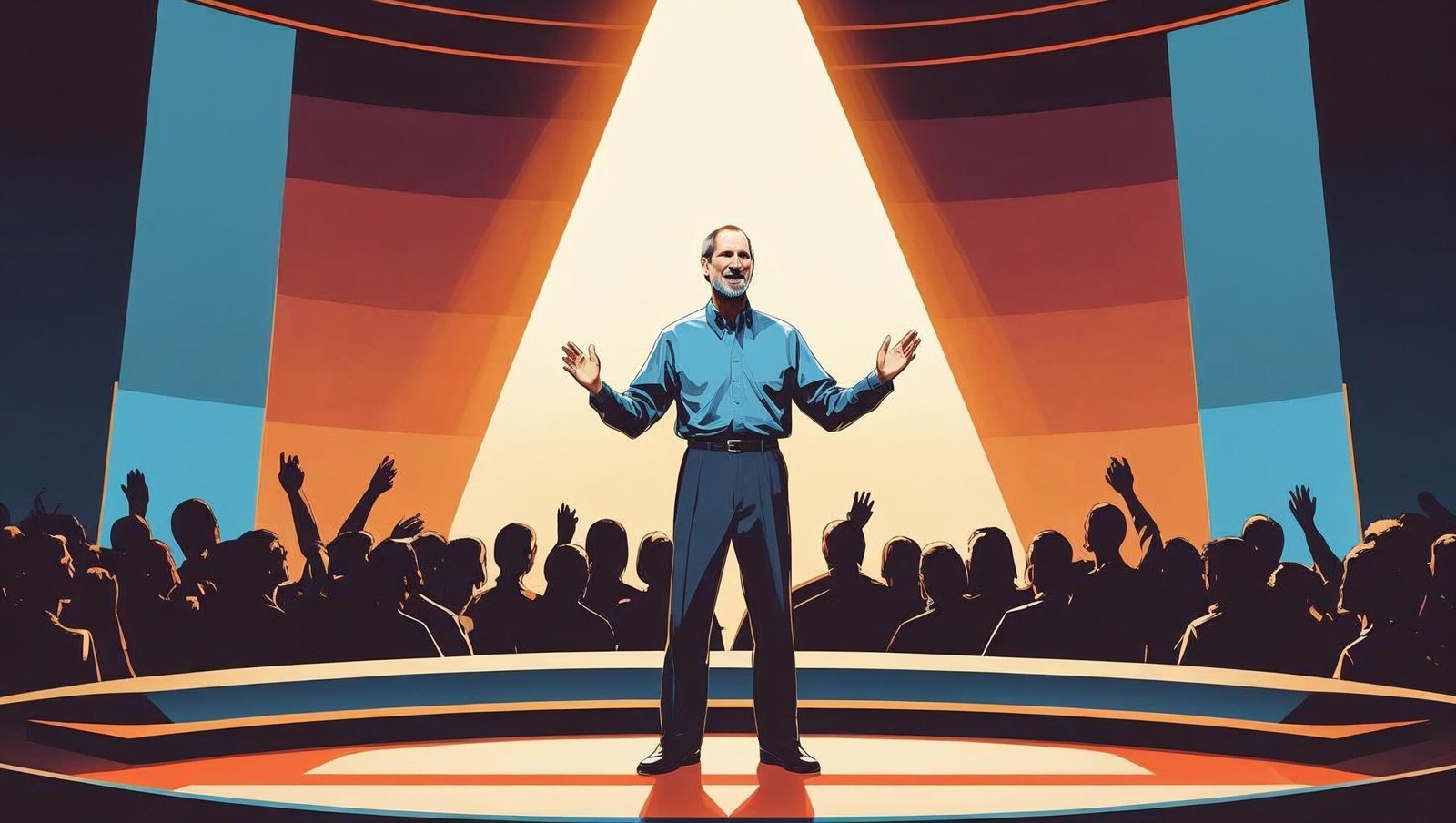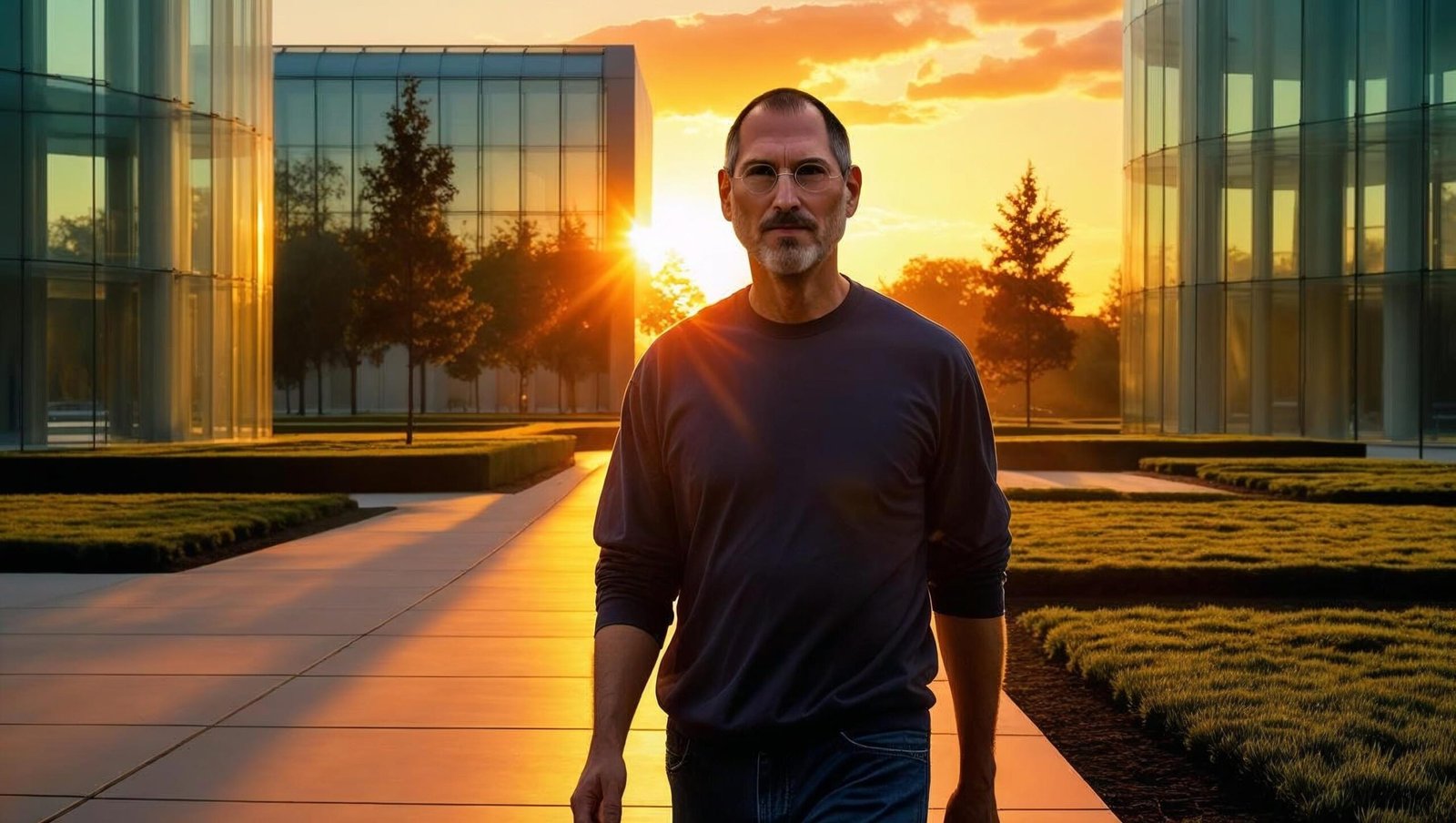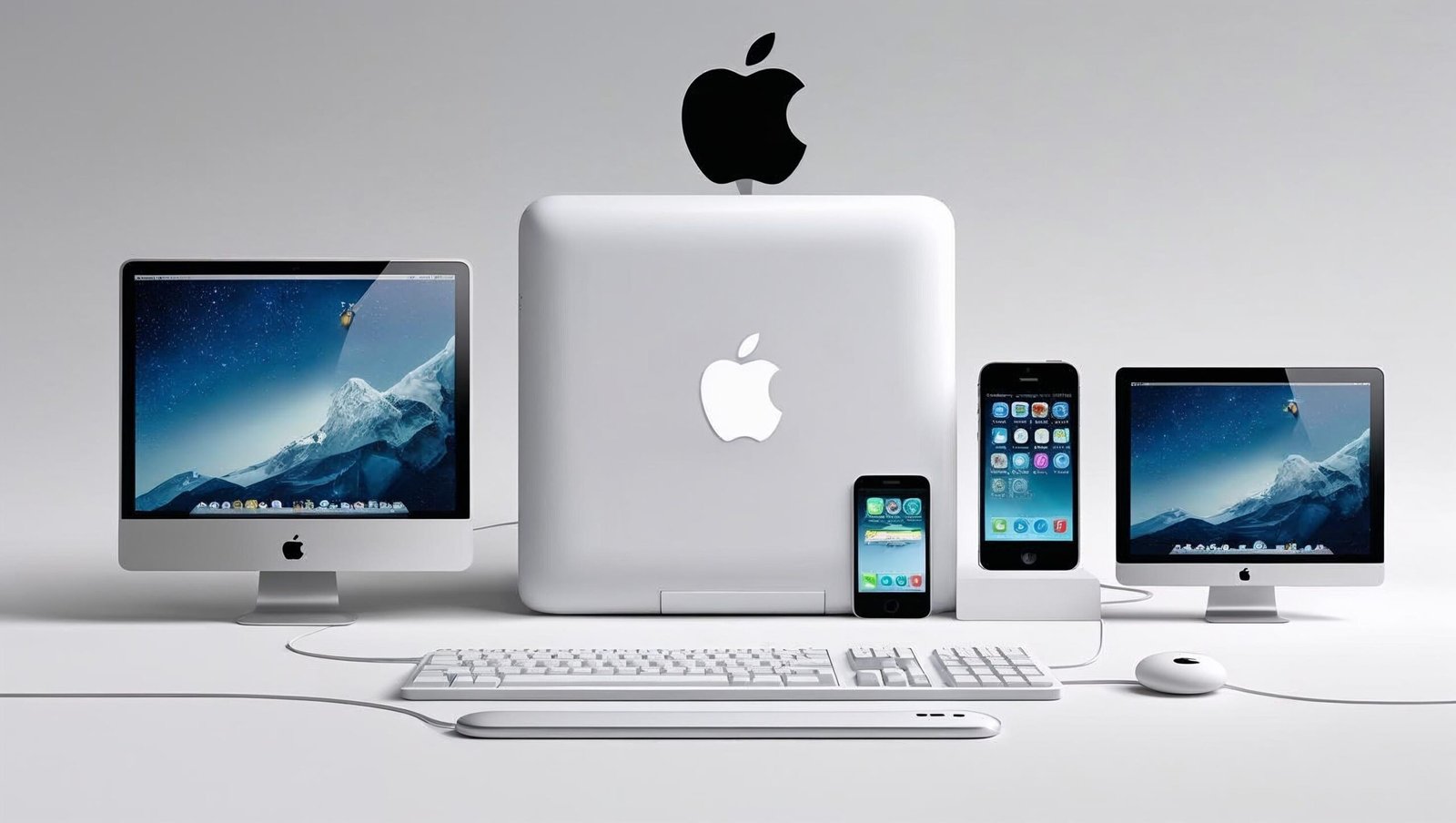Steve Jobs by Walter Isaacson: 15 Brutally Honest Lessons from the Visionary Genius
In this exhaustive analysis of Steve Jobs by Walter Isaacson, we navigate the raw, inspiring, and often unsettling journey of the co-founder of Apple Inc. The book, commissioned by Jobs himself and written by one of the most respected biographers of our time, is not a fawning tribute but an unfiltered account of a man who revolutionized multiple industries yet struggled with relationships, ego, and mortality.
This review of Steve Jobs by Walter Isaacson is not merely a summary; it is an exploration of character, conflict, and creativity. Isaacson has crafted a biography that does justice to Jobs’ mythos without sanitizing his flaws.

Childhood and Roots of Rebellion
The early chapters of Steve Jobs by Walter Isaacson trace Jobs’ beginnings as an adopted child in Silicon Valley. His adoptive father, Paul Jobs, instilled in him a love for craftsmanship. But even as a child, Jobs showed signs of rebelliousness, arrogance, and an utter disdain for mediocrity.
Isaacson explains how these early traits formed the core of his personality—brilliant but tempestuous, focused yet emotionally volatile. In this Steve Jobs by Walter Isaacson review, we see how nature and nurture collided to forge a mind that challenged norms relentlessly.
Apple’s Genesis: The Garage Dream
The now-legendary story of Apple’s inception in a garage with Steve Wozniak is given new life in Steve Jobs by Walter Isaacson. Jobs may not have been the technical wizard, but he had a preternatural ability to envision what people wanted before they knew they wanted it.
His pursuit of elegance, design, and simplicity—even in circuit boards—was evident early on. According to Steve Jobs by Walter Isaacson, Jobs believed the unseen should be as perfect as the visible. This obsessive philosophy laid the foundation for Apple’s brand ethos.
The Rise and the Fall: Ego Versus Teamwork
A particularly compelling portion of Steve Jobs by Walter Isaacson is his fall from Apple in 1985. Jobs was pushed out due to his confrontational management style and unwillingness to compromise. But rather than fade, he founded NeXT and bought Pixar, both of which became vehicles of reinvention.
Through NeXT, Jobs developed the software that would later become the basis for macOS. At Pixar, he revolutionized animation. Steve Jobs by Walter Isaacson reveals how exile taught Jobs humility, but never dampened his passion for excellence.
Return to Apple: Redemption and Renaissance
When Jobs returned to Apple in 1997, the company was near collapse. Yet, as Steve Jobs by Walter Isaacson illustrates, he engineered one of the greatest corporate comebacks in history. The iMac, iPod, iPhone, and iPad were not just devices—they were cultural phenomena.
Jobs’ meticulous involvement in every product decision, down to fonts and packaging, made Apple’s identity synonymous with innovation. In this Steve Jobs by Walter Isaacson review, we see the rebirth of a man who now combined vision with wisdom.

Reality Distortion Field: Strength or Flaw?
A recurring theme in Steve Jobs by Walter Isaacson is his infamous “reality distortion field.” Jobs would bend facts, timelines, and expectations to suit his will. At times, this led to innovation; at others, it fostered burnout and resentment.
Yet many of his colleagues admitted that without his impossible demands, they would not have achieved the impossible. This paradox is central to the Steve Jobs by Walter Isaacson narrative: greatness often requires discomfort.
Design Obsession: Beauty Meets Function
Jobs was not an engineer, but Steve Jobs by Walter Isaacson shows how he became the ultimate curator. He obsessed over product design like an artist. Whether it was the curve of the iPhone or the sound of a MacBook booting up, Jobs saw products as holistic experiences.
He collaborated with Jony Ive to ensure every Apple product was intuitive and beautiful. This Steve Jobs by Walter Isaacson review emphasizes that for Jobs, design wasn’t decoration—it was the soul of the product.
Personal Life: Troubled Yet Tender
Jobs was famously distant—even cruel—to colleagues and sometimes family. He denied paternity of his daughter Lisa for years. Steve Jobs by Walter Isaacson does not shy away from these truths. Yet, the book also captures his softer moments—his love for Zen Buddhism, his search for spiritual meaning, and his attempts to be present in his children’s lives later in life.
This complexity is what makes Steve Jobs by Walter Isaacson a riveting biography. It is neither deification nor condemnation—it is real.
Final Years: Facing Mortality
Diagnosed with pancreatic cancer in 2003, Jobs initially chose alternative medicine, delaying surgery—a decision he later regretted. Even as his health declined, he poured his energy into future projects, including the Apple Campus and the iPad 2.
In Steve Jobs by Walter Isaacson, his final moments are poignantly described—filled with reflection, love, and the acceptance that death gives life its sharpest focus. He said, “Death is very likely the single best invention of life.”

15 Brutally Honest Lessons from Steve Jobs’ Life
1. Follow intuition over convention
Jobs often trusted instinct more than data.
2. Perfection is worth chasing
He delayed launches until the product met his aesthetic standards.
3. Say no to 1,000 things
Focus was his superpower.
4. Innovate at the intersection of art and science
He blended engineering with artistry.
5. Don’t ask people what they want
He believed people don’t know until you show them.
6. Simplicity is genius
Fewer buttons, cleaner lines, better user experience.
7. Reality is negotiable
He pushed teams beyond what they thought possible.
8. Control the entire ecosystem
Hardware, software, and retail—all unified.
9. Stay hungry, stay foolish
His Stanford speech remains iconic.
10. Think long-term
Jobs often planned five years ahead.
11. Protect your brand fanatically
He defended Apple’s design and identity fiercely.
12. Emotional storytelling sells
His product launches were performances.
13. Compete with yourself
Jobs never relied on past success.
14. Challenge your people
He got the best out of his team—often through fire.
15. Accept mortality with dignity
He left knowing he gave his all.
The Philosophical Dimensions of Jobs’ Leadership
While most corporate leaders are judged by their performance metrics, shareholder returns, or expansion strategies, Jobs’ legacy resists such simplistic quantification. One of the striking elements explored in Steve Jobs by Walter Isaacson is the deeper, almost metaphysical way Jobs approached business and life itself. His intense focus on Zen Buddhism, asceticism, and minimalist living deeply influenced his aesthetic preferences and product development principles.
He did not merely want to sell products. He wanted to infuse them with meaning—to create tools that empowered individuals to express themselves, connect, and imagine. His pursuit of purity was not limited to form but extended to function, team structure, messaging, and customer interaction. Apple was never just a tech company in his eyes; it was a movement toward elegance and empowerment.
In a world of expanding chaos, he championed restraint. He stripped away the unnecessary, even when it meant eliminating features others believed essential. His philosophy dictated that elegance was not the absence of clutter, but the presence of clarity.
His Love-Hate Relationship with Authority
Jobs maintained a turbulent relationship with conventional authority throughout his life. From dropping out of Reed College to walking barefoot through Atari’s offices, his contempt for structured systems and bureaucracies was evident. He rebelled not out of immaturity, but from a belief that structure often stifled innovation.
In managerial terms, he reinvented what it meant to lead. Where most executives adopted hierarchies and committees, Jobs centralised control. He hated diluted decision-making and preferred direct responsibility. Steve Jobs by Walter Isaacson paints a vivid picture of a man who wanted to be involved in every detail, not because he distrusted his team, but because he believed in holistic coherence.
It is also notable that Jobs, despite his disdain for traditional authority, built one of the most vertically integrated businesses in the world. Apple’s control over hardware, software, and distribution channels was absolute. This paradox—the rebel who built a tightly controlled empire—is one of the book’s most revealing insights.
Marketing as a Form of Art
One of Jobs’ most underappreciated skills was his mastery of narrative. He understood that people do not just buy products—they buy stories. From the “1984” Macintosh ad to the iPhone keynotes, Jobs turned product announcements into cultural events.
He meticulously choreographed product launches, practicing for hours, obsessing over slide transitions and even the pauses between words. The effect was electric. He did not present features; he offered transformation. The product became an extension of a personal identity—sleek, capable, and desirable.
In the biography, Isaacson delves into how Jobs perceived marketing not as a function of the sales department, but as the soul of the company’s mission. Every advertisement, store design, and packaging detail had to reflect Apple’s core values. And that core, as always, circled back to simplicity, beauty, and function.

The Deep Impact on Creative Professionals
One of the less explored but profoundly important impacts of Jobs’ work, highlighted subtly in Steve Jobs by Walter Isaacson, is his influence on creative professionals. Before the Macintosh, personal computers were primarily designed for scientists, engineers, and accountants. Jobs reimagined the computer as a creative partner.
He championed high-resolution displays, intuitive user interfaces, typography, colour, and sound—all features that directly catered to artists, writers, musicians, and filmmakers. The modern digital creative renaissance owes much to Jobs’ insistence that tools should not just be powerful but also artistically liberating.
This vision continues today. Designers who open Adobe Photoshop on a MacBook Pro or musicians composing in Logic Pro X are part of Jobs’ enduring legacy. The tools he brought to life did not merely perform functions—they became portals to creative expression.
Ruthlessness Versus Righteousness
A recurring motif in Isaacson’s biography is Jobs’ sharp duality—his tender idealism clashing with his abrasive interpersonal behavior. He was capable of emotionally devastating employees, using phrases like “this is shit” or “you’re a bozo,” often in public meetings. And yet, many of those employees stayed, some even thriving under his fire.
The question arises: Was the cruelty a necessary evil? Did his harshness extract a level of performance unattainable through kindness? Steve Jobs by Walter Isaacson does not offer an easy answer but instead presents evidence on both sides. His most loyal collaborators, such as Jony Ive, admitted that while Jobs was difficult, he pushed them to achieve work they never imagined possible.
Still, the emotional toll was undeniable. Many employees burned out. Some left Apple permanently disillusioned. And yet, years later, many would say they produced the best work of their careers under his watch. This moral ambiguity is one of the richest themes explored in the book, leaving the reader to contemplate whether greatness and gentleness can truly coexist in high-stakes innovation.
Reinvention as a Constant Theme
A critical message embedded throughout Steve Jobs by Walter Isaacson is that reinvention is not a singular act but a continuous process. Jobs reinvented himself after every setback—after being fired from Apple, after failing at NeXT, and even after being diagnosed with terminal cancer.
He reinvented industries too. Personal computing, animated films, music distribution, mobile phones, and tablet computing were all domains that Jobs either revolutionized or fundamentally redirected. This ability to adapt and reshape both self and sector is arguably what sets him apart from other business titans.
What is remarkable is that he never seemed to run out of courage. Each reinvention was bolder than the last, more ambitious and more transformative. The story serves as a blueprint for resilience—for facing life’s inevitable adversities not with despair, but with design.
Legacy Beyond the Products
While Apple’s product line remains Jobs’ most visible legacy, Steve Jobs by Walter Isaacson suggests that his cultural impact may be even more significant. He altered how society perceives technology—not as cold tools but as companions. He made design a business priority, not a decorative afterthought. And he changed how companies engage with their customers—not as clients, but as followers.
Jobs’ emphasis on cross-disciplinary thinking, where engineering and humanities converge, has inspired educational programs, design schools, and entrepreneurial methodologies. His life serves as a case study in business schools and is quoted in leadership seminars around the globe.
But perhaps most importantly, he reminded the world of the power of belief. That an individual, with enough passion and vision, could shape the future. That imperfections are not disqualifications, but the soil from which greatness often grows.

The Emotional Undertone of the Final Chapters
The concluding chapters of Steve Jobs by Walter Isaacson carry a heavy emotional undertone. They depict a man racing against time, working feverishly on product designs, mentoring successors, and spending more time with family. As his health deteriorated, Jobs displayed an introspective clarity that had been absent in earlier years.
He seemed to come full circle—from a difficult child who craved control to a father striving to make peace, and a leader trying to ensure his vision endured beyond his presence. Isaacson’s depiction of these moments is intimate and humane, revealing a man who, for all his failings, cared deeply about meaning, legacy, and love.
The final words Jobs uttered—“Oh wow. Oh wow. Oh wow.”—as described by his sister, suggest awe rather than fear, as if he was glimpsing the unknown with the same curiosity that had fueled his entire life.
A Final Reflection
In summation, this extended meditation on Steve Jobs by Walter Isaacson seeks to honour the fullness of the biography. It is not just about computers or corporate growth. It is about ambition, spirituality, failure, redemption, and the quest for perfection.
The book invites readers to look beyond the headlines and the product keynotes. It beckons us to reflect on our own standards, our own capacity to dream, and our willingness to challenge what is to create what could be.
Jobs’ life was not comfortable. Nor was it always commendable. But it was undeniably meaningful. And in that, he achieved something very few ever do—not just success, but significance.
Conclusion
Steve Jobs by Walter Isaacson is not a tale of perfect leadership or flawless humanity. It is a mosaic of contradictions—brilliance and cruelty, vision and volatility, love and loneliness. This review of Steve Jobs by Walter Isaacson affirms that greatness is often born from tension.
For entrepreneurs, creatives, leaders, or simply admirers of human complexity, this biography is essential. It is not only a mirror of Steve Jobs’ journey but also a window into how one person can truly shape the world.
For more such meaningful and expansive reviews, visit shubhanshuinsights.com.
FAQs – Steve Jobs by Walter Isaacson
Q1. Is Steve Jobs by Walter Isaacson an authorized biography?
A1. Yes, Jobs himself requested Isaacson to write the biography, granting him full access and control-free narration.
Q2. Is the book suitable for aspiring entrepreneurs?
A2. Absolutely. It’s filled with valuable insights on leadership, innovation, design, and personal growth.
Q3. Does the book portray Jobs only in a positive light?
A3. No. It presents a balanced and unfiltered account of both his genius and flaws.
Q4. What industries did Jobs impact according to the biography?
A4. Technology, music, telecommunications, retail, and animation, among others.
Q5. Why is Steve Jobs by Walter Isaacson considered one of the best biographies?
A5. Because of its access, honesty, depth, and the compelling life story it tells.